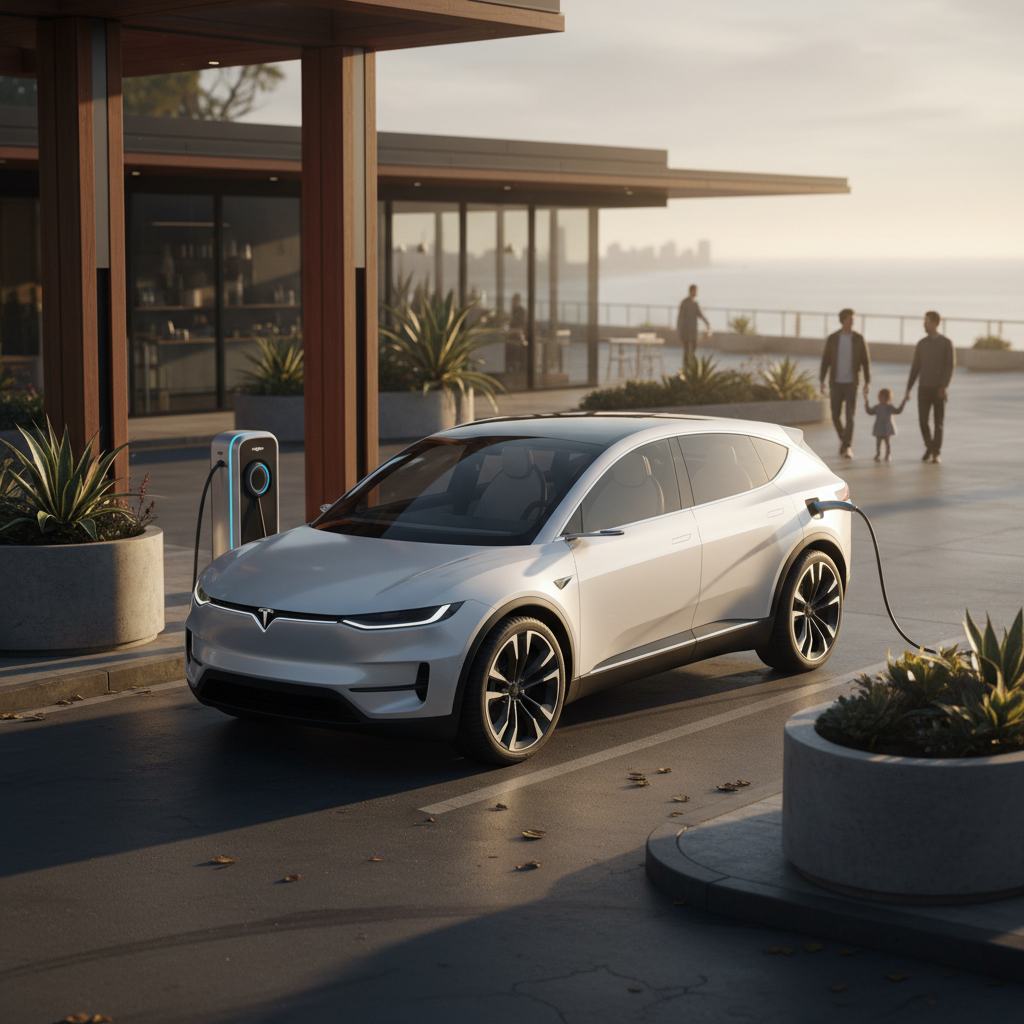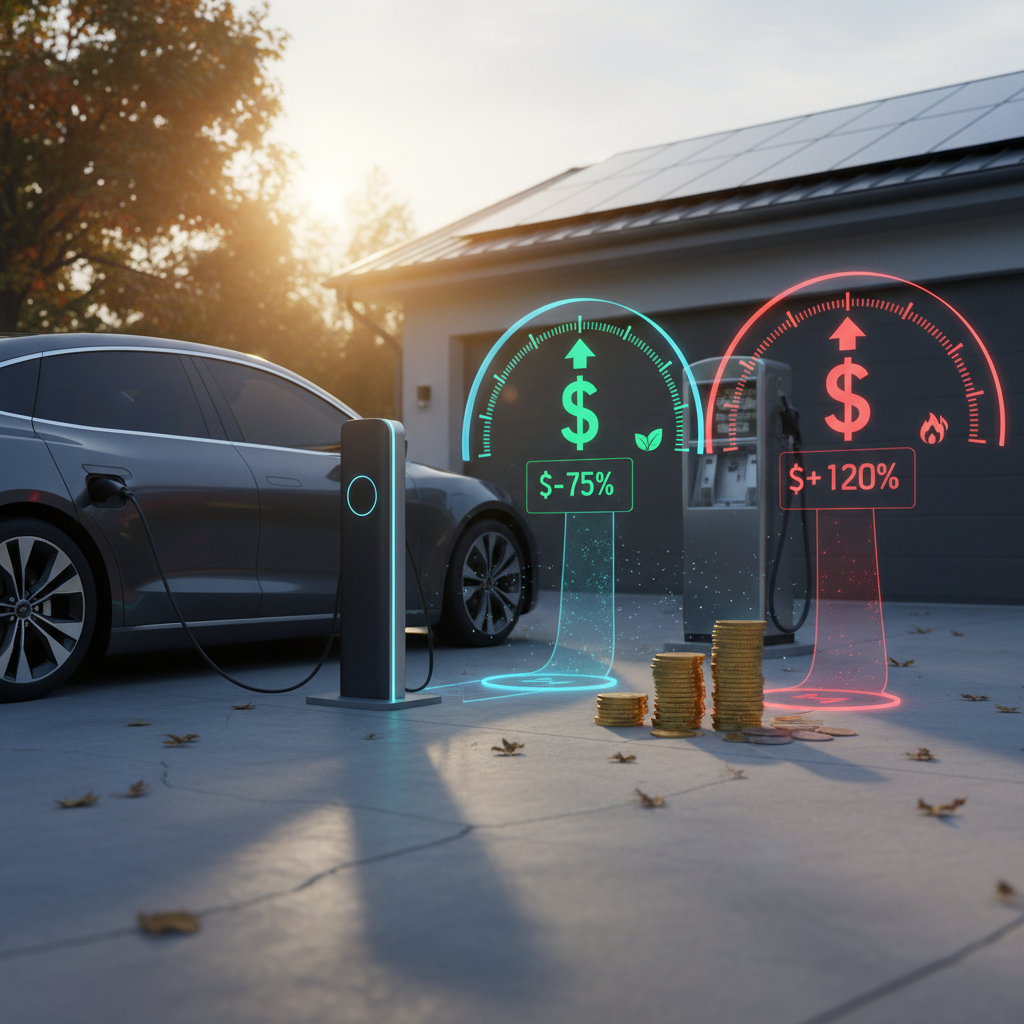The age of the AWD electric car is here. Dual‑motor Teslas, Hyundai’s IONIQ 5, BMW’s i5, Ford’s Mustang Mach‑E, Lucid’s Air, all lean heavily on all‑wheel drive not as an option, but as the default personality: fast, planted, and eerily confident in bad weather. If you’re wondering whether your next EV should have AWD, and how to shop smart (especially used), this guide is for you.
Quick definition
Why AWD electric cars are everywhere now
A decade ago, an AWD badge on a sedan meant winter competence and maybe a touch of rally cosplay. In EV land, AWD became the killer app: instant traction plus outrageous 0–60 times. As U.S. EV sales have climbed past a million units annually and SUVs dominate the market, automakers are leaning into AWD electric SUVs and crossovers as their main course, not a side dish.
The bigger EV picture behind AWD
Who benefits most from AWD in an EV
How AWD electric cars actually work
No transfer case, no drama
In a gas AWD car, power leaves the engine, goes through a transmission, into a transfer case, and then out through driveshafts and differentials. Each component adds weight, cost, and delay.
In an AWD electric car, front and rear axles are usually powered by separate electric motors. Software tells each motor exactly how much torque to deliver, and it can change that decision hundreds of times per second.
Torque vectoring by algorithm
Because the car can control torque at each axle (and sometimes each rear wheel), it can do tricks that mechanical systems only dream about. In a fast corner, the rear motor can push harder while the front motor just guides; if a front tire touches ice, the car can shift power rearward instantly.
The result feels less like old‑school AWD and more like a smart, invisible stability engineer riding shotgun.
The upshot is that an AWD EV doesn’t just add traction; it adds precision. Where traditional systems react to a slip, dual‑motor EVs are constantly predicting and preventing it.
AWD EV vs gas AWD: what’s different on the road
How AWD electric cars feel different from gas AWD
Same badge on the trunk, very different personalities under the skin.
Launch control, every day
An AWD EV shoves you forward instantly. There’s no turbo spool, no downshift, just a clean, linear surge. Even family crossovers like a dual‑motor Hyundai IONIQ 5 or VW ID.4 feel quicker off the line than many performance gas SUVs.
Ultra-smooth power delivery
Electric motors deliver maximum torque from 0 rpm, so an AWD EV feels calm yet authoritative. No shifts, no hunting for gears on a hill, just quiet thrust. The cabin experience is more luxury train than roaring rally car.
Quieter, cleaner, heavier
AWD EVs are typically heavier than comparable gas AWD models thanks to their batteries. That extra weight actually helps them feel planted in bad weather, though it can soften steering feel and limit ultimate cornering fun if the suspension tuning isn’t up to the task.
Less to service
No engine oil, no transmission fluid, no transfer case, and far fewer moving parts. The main long‑term items are tires, brakes (which often last longer thanks to regen), coolant for the battery system, and, eventually, the battery itself.
Don’t confuse grip with invincibility
The main types of AWD electric car setups
- Dual‑motor symmetric AWD: One motor up front, one at the rear, with similar power outputs. Common in cars like the Tesla Model Y Long Range or Mustang Mach‑E Premium AWD.
- Rear‑biased performance AWD: A powerful rear motor and a smaller front unit that wakes up when needed. Vehicles like Hyundai’s IONIQ 5 N or some BMW i4/i5 variants use this formula for playful handling.
- Tri‑ or quad‑motor AWD: The lunatic fringe. Think high‑end performance sedans and SUVs with a motor per axle or per rear wheel, allowing wild torque‑vectoring tricks and eye‑watering acceleration.
- On‑demand front motor: In some efficiency‑minded AWD EVs, the front motor can decouple under light loads, effectively turning the car into RWD to save energy, then snapping back into AWD when conditions demand.
AWD badges vs reality
Notable AWD electric cars and SUVs in 2025
Line up the current crop of AWD electric cars and you get a gallery of wildly different personalities, from weaponized family haulers to sober luxury sedans. Here’s a high‑level look at the landscape, not an exhaustive price sheet.
Sample AWD electric cars and SUVs to know
Representative models that show how wide the AWD EV spectrum has become.
| Model | Type | Powertrain highlight | Approx. EPA range (AWD) | Character |
|---|---|---|---|---|
| Tesla Model Y Long Range AWD | Compact SUV | Dual‑motor, rear‑biased AWD | ~310 mi | America’s default family EV: quick, efficient, minimalist. |
| Hyundai IONIQ 5 AWD | Compact SUV | Dual‑motor with playful RWD feel | ~260–270 mi | Design‑forward, comfortable, quietly quick. |
| Ford Mustang Mach‑E GT AWD | Sporty SUV | High‑output dual motors | ~270 mi | Electric muscle car vibe without the fuel bills. |
| BMW i5 xDrive | Midsize sedan | Dual‑motor luxury AWD | ~300+ mi | Classic 5‑Series composure with silent thrust. |
| Mercedes‑Benz EQE 350 4Matic | Midsize luxury | Dual‑motor 4Matic | ~280–300 mi | Comfort‑first, tech‑heavy cruiser. |
| Rivian R1S Dual/Quad Motor | 3‑row SUV | Adventure‑spec AWD, variable ride height | ~270–390 mi (battery & motor dependent) | Overlanding and Costco runs in the same day. |
| Lucid Air Touring / Grand Touring | Luxury sedan | High‑efficiency dual‑motor AWD | 300–400+ mi | Hyper‑efficient long‑legged grand tourer. |
Always verify current trims, prices, and EPA ranges; figures change frequently with new model years.
Where Recharged fits in

Range realities: what AWD does to your EV miles
Adding a second motor doesn’t double your electricity use, but it isn’t free. Compared with single‑motor versions, an AWD electric car typically loses somewhere around 5–15% of rated range, depending on how it’s driven and how often the second motor is helping.
The range trade-offs with AWD EVs
Where the extra motor helps, and where it doesn’t.
Highway cruising
On a dry highway at steady speeds, some AWD EVs can partially disengage the extra motor and behave like a single‑motor car. In those cases, the range penalty is modest.
Cold, snow, and slush
Cold batteries and rolling resistance from snow already hurt range. Add in the extra power used to keep two motors at the ready, and you can see bigger dips than in a comparable RWD EV.
Stop‑and‑go city driving
Lower speeds plus regenerative braking mean the AWD penalty shrinks. In heavy traffic, the difference between single‑ and dual‑motor can be surprisingly small.
Don’t panic about winter range drops
Winter driving in an AWD EV
Here’s the good news: a decent set of winter tires on an AWD EV will make you question why you ever bothered with a gas truck. The bad news: if you rely on the all‑season tires that came from the factory, you’ll still be limited by physics.
Winter setup checklist for your AWD electric car
1. Prioritize tires over badges
If you live with real snow, fit a quality winter or all‑weather tire. An AWD EV on proper rubber will outperform a 4x4 SUV on worn all‑seasons every time.
2. Learn your drive modes
Many AWD EVs have Snow or Eco modes that soften throttle response and bias power for stability. Spend five minutes in the owner’s manual, it pays off the first time you hit black ice.
3. Use pre‑conditioning smartly
Warm up the cabin and battery while the car is still plugged in. You start with a full battery and warm pack instead of burning range to get comfy.
4. Watch ground clearance
Some EV crossovers sit lower than traditional SUVs. Deep snow can pack under the car like a bobsled run. Know your clearance and don’t follow taller trucks into rutted roads.
5. Manage regen braking on slick roads
Many EVs let you dial back regenerative braking. In extreme slick conditions, less regen can make the car feel more predictable under deceleration.
6. Pack charging and warmth basics
In serious winter, carry a snow brush, small shovel, gloves, and charging adapters. AWD doesn’t prevent traffic jams, and cold waits are easier with a bit of planning.
Buying a used AWD electric car: what to look for
Shopping for a used AWD EV is where things get interesting, and where a little knowledge can save you thousands. You’re not just choosing a trim; you’re choosing battery history, motor configuration, and software behavior that might have changed after updates.
Key inspection points for used AWD electric cars
Go beyond kicking the tires.
Battery health & fast‑charge history
Battery degradation matters more than odometer readings. Has the car fast‑charged constantly on road trips, or mostly been slow‑charged at home? At Recharged, our Recharged Score battery diagnostics quantify health so you’re not guessing.
Motor and inverter behavior
Take a proper test drive. Listen for unusual whines or vibrations when accelerating or lifting off. Modern electric drivetrains are very reliable, but repairs can be expensive if abused.
Software, modes, and updates
Ask which software version the car is running, whether it gained or lost features over the air, and how its AWD and traction modes work in the real world. A 2021 car may drive differently in 2025 than it did new.
Questions to ask the seller
- Has the vehicle lived mostly in hot or cold climates?
- How often was DC fast charging used vs. home Level 2?
- Any warnings or errors related to the drive system or battery?
- Has the car been used for towing or rideshare duty?
How Recharged de‑risks the process
Every AWD EV we list comes with a detailed Recharged Score Report, covering battery state of health, charging history signals, and pricing versus the wider market. You can browse, get an instant offer on your trade‑in, arrange financing, and schedule nationwide delivery, all online, or with EV‑specialist help from our team.
One AWD EV to avoid (for you)

Financing, insurance, and total cost of ownership
AWD almost always costs more than a single‑motor version of the same EV, both at purchase and over time. But in exchange you’re getting more performance, more traction, and often better resale value. The question is whether those benefits are worth the premium for your real life.
Typical cost differences: AWD vs single‑motor EV trims
Order‑of‑magnitude differences you can expect when cross‑shopping trims. Numbers will vary by model and region.
| Area | Single‑motor EV | AWD EV | What it means for you |
|---|---|---|---|
| MSRP / used price | Lower purchase price | $2,000–$7,000 higher when new; used prices vary | AWD trims command a premium, especially on popular SUVs. |
| Insurance | Baseline EV rate | Often slightly higher | More power and higher replacement value can bump premiums. |
| Efficiency & energy cost | Best case scenario | 5–15% higher consumption | You’ll spend a bit more on electricity over the life of the car. |
| Tires & wheels | Smaller, cheaper sizes | Larger wheels, performance rubber common | Factor this in if you’re clocking lots of highway miles. |
| Resale value | Depends on region | Often stronger where winters are real | In snow states, AWD can make your EV easier to sell later. |
Use this as a directional guide; always compare specific trims and quotes.
Use financing to level the field
FAQ: AWD electric car questions, answered
Frequently asked questions about AWD electric cars
Is an AWD electric car right for you?
If you live where it snows, drive unpaved roads, or just love the feeling of bottomless traction and instant passing power, an AWD electric car is a deeply satisfying way to go electric. The trade‑offs, a bit less range, a bit more cost, are real but manageable if you choose the right model and keep your expectations honest.
The smartest move is to start with your life, not the spec sheet. How often do you really see snow? How far are your longest regular trips? What will insurance, electricity, and tires cost where you live? Then look at specific AWD EVs that fit that reality and compare them against single‑motor alternatives. Tools like the Recharged Score battery health report, transparent pricing, and EV‑specialist guidance can turn what feels like a gamble into a straightforward decision.
When you’re ready to explore real cars, not just spec charts, you can browse used AWD EVs on Recharged, trade in your current vehicle for an instant offer, line up financing online, and have your next car delivered to your driveway. AWD, done right, doesn’t just get you through winter; it makes every season feel like the good‑weather months.



